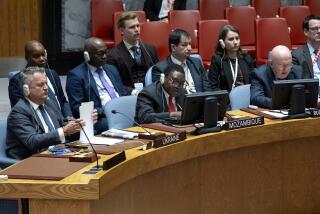35-Nation Rights Session Unable to Draft Statement
OTTAWA — Officials from the 35 nations that signed the 1975 Helsinki accords, concluding the first follow-up meeting devoted solely to human rights, abandoned efforts today to adopt a final statement.
The 35 nations deadlocked, despite marathon negotiations over the final weekend of the six-week conference, because they could not agree whether to recommend another meeting on the same subject.
A proposal from Finland, Switzerland, Sweden, Yugoslavia, Austria and other neutral countries--backed by the United States and its NATO allies--recommended a future conference to continue the examination of compliance with the Helsinki human rights pledges.
The Soviet Bloc nations rejected that and responded with a proposal to note interest in future meetings but leave the issue up to an assembly of the same 35 countries in Vienna next year. Western delegates turned down the Soviet draft.
The two sides also disagreed on other wording. For instance, they disagreed on whether to call attention to “serious violations of human rights and fundamental freedoms in some participating states.” But delegates said the question of future meetings was the central problem.
The Ottawa assembly is part of the Conference on Security and Cooperation in Europe, a process begun a decade ago in Helsinki. Any decision must be reached by consensus of all 35 countries--Canada, the United States and all of East and West Europe except Albania.
More to Read
Sign up for Essential California
The most important California stories and recommendations in your inbox every morning.
You may occasionally receive promotional content from the Los Angeles Times.







